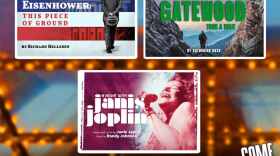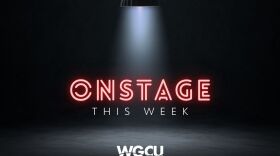This Black History Month, in honor of those of black heritage here in Southwest Florida, WGCU is featuring local African Americans from across the region. Today, you'll hear from a man whose childhood in the still-segregated South inspired him to one day be one of the most inclusive hosts in the area.
“Hi, I’m Lee Pitts, the host of the award-winning Lee Pitts Live on Fox 4 that’s been airing in Southwest Florida for the past 28 years. We’re so proud to be the longest-running local television talk show in Southwest Florida’s history, and it’s the first television show and the only television show on broadcast TV that’s ever been hosted by an African American.
Black History Month, first got exposed to it in elementary school, didn’t have any real concept of what it meant at the time, but now, I really have a great affinity for it. This gives us an opportunity and all people to take a moment and say, ‘Hey, here’s some portions of black history and here’s how it contributed to the total fabric and the development of this country and how it influences culture, literature, dressing, style, music.’ Black culture is woven into the American fabric – from sports to politics to education. If it was not for black history and African Americans’ contribution to America, many of those things never would have existed.
I grew up actually in Birmingham, Alabama in the 1960s. I was a little boy, but I was well aware of what happened back then. In 1966, you know, the civil rights bill had not been passed, and those types of things hadn’t existed. I was 6 years old then, and my mom tells me the story about 16th Street Baptist church that was bombed in 1963, wasn’t too far from where we lived. It really sparked another level of attention to the city of Birmingham, which was the most segregated city in the southern part of the country. Those five little children were killed, and as a result of that, many black parents started to get even more concerned about the future of their children. So, I’m a product of that.
But, I grew up poor in the South. My mom raised seven children by herself. At five years old, my first job was babysitting my sister. My mom came to me and said, ‘Hey, you got to keep her, you know, maybe seven hours a day until your older siblings get home from school.’ So, I would change the diaper. I would make her lunch. You know, just everything that an adult would be doing, I was five years old doing it. At five years old, nobody was keeping me. But, not only was I keeping myself, but I was keeping my sister.
I didn’t even think it was a big deal at the time. It was only looking back that I realized that, and then, I also, in looking back at those kinds of things, I realized the struggle of many poor people, people who don’t have everything. You know, I’m familiar with food stamps and welfare and all of that, even though now my station in life is totally different.
Up until this point now, I’ve interviewed over 18,000 people over 28 years, met all types of movers and shakers of all races. Interesting thing though, by my being black, people can tune into my show. They see all types of races, but they’ll still, many people, say, ‘It’s a black show.’ Why is that?
First of all, I don’t want people to not see me as black. I want you to see me as black. I don’t want people to say, ‘I don’t see you as black.’ Oh, well, you need some glasses? You don’t see this brown skin? Of course. But, I want you to associate what you see with what’s happening.
Okay, so if I was a criminal and you saw me as black or, black people in general, if you see them as black when they’re in trouble, then when you see positive quality work taking place in the media, see us as black then too. What does that do? That gives that positive moment credit just like you would give the negative moment credit. So, see me as black.
But, the television show encompasses a whole lot of things. We rarely talk about race. But, what I do is I can specifically say, ‘Hm, I think I want to interview a dentist today.’ So, I can reach into my contacts, and I can find a Hispanic dentist. I can find a black dentist on purpose. And, they will be talking about something that’s germane everybody. Sure, white dentist as well.
Now, if the media is controlled by whites, most of their contacts are naturally whites. They may not be doing it on purpose, but when it’s time for them to try to find diversity they have to struggle. But, if you’re in that type of high level, you have to work at diversifying everything that you know about your community so that you can deliver a wide range of viewpoints, a wide range of images and faces. And, progress has been made in that field, specifically with cable television, with the internet and all types of voices, but there’s still a lot to be done.”








